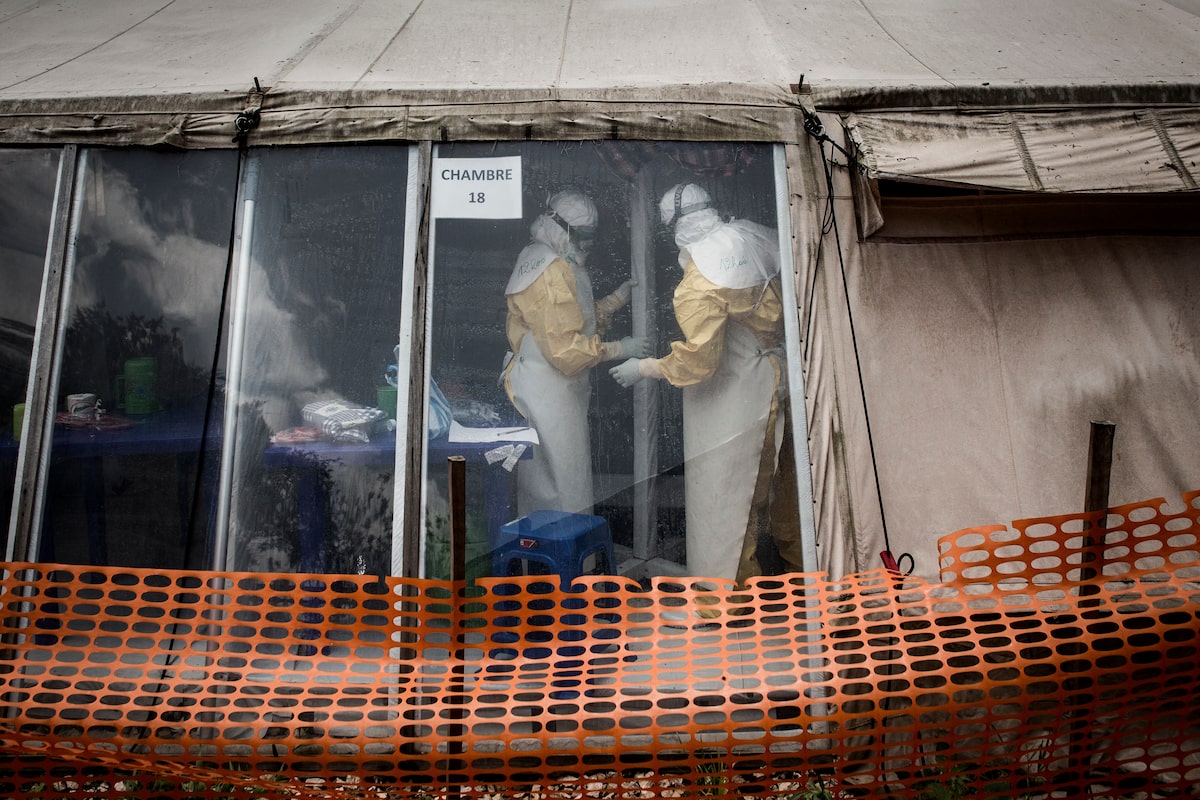Health workers inside the ‘red zone’ of an Ebola treatment centre in Butembo in March 2019. A new outbreak of the Ebola virus in the Democratic Republic of the Congo has killed 15 people since the end of August, the health minister said Thursday.JOHN WESSELS/AFP/Getty Images
A new Ebola outbreak in the Democratic Republic of the Congo, which has already killed 15 people, will test the capacity of the global health system to mobilize a response after drastic U.S. budget cuts, health experts say.
The outbreak was confirmed on Thursday after laboratory tests found the virus in the DRC’s Kasai province. With 28 suspected cases and 15 deaths, the latest outbreak of the Zaire strain of Ebola has had a worrisome 54-per-cent fatality rate, officials said.
In previous Ebola outbreaks in Africa, the United States has played a crucial role in providing funds and medical specialists to help end the crises. But the Trump administration has eliminated most global health programs and slashed aid to the World Health Organization, sparking fears that the latest response will be severely weakened.
“The recent aid cuts will definitely have an impact,” said Patrick Otim, an emergency-response manager at WHO’s Africa office, in a media briefing on Thursday.
Global solidarity will be needed to contain the outbreak, Dr. Otim said. “Diseases do not respect borders. When you have an outbreak in one area, it can quickly move to another area.”
Congo’s proposed peace deal with M23 would reinstate government control to rebel-held areas
Under President Donald Trump this year, the United States pulled out of the WHO, where it had been the biggest financial supporter with hundreds of millions of dollars in funding every year.
It also dismantled the U.S. Agency for International Development (USAID) and eliminated billions of dollars in global health programs at the agency, transferring the few remaining programs to the U.S. State Department.
Equally significantly, the Trump administration has purged the top leadership at the U.S. Centers for Disease Control and Prevention, a key source of medical experts in previous Ebola outbreaks, and has removed many of its programs and personnel. With the CDC now in turmoil, it is unlikely to be able to help Congo in the latest outbreak, analysts say.
“The elephant in the room is the near-total disappearance of the U.S. government from any kind of leadership on global health and outbreak response,” said Jeremy Konyndyk, president of Refugees International and former head of USAID’s global response to the COVID-19 pandemic.
“The State Department does not have any kind of deployable outbreak response capacity in the way that USAID had built,” Mr. Konyndyk told The Globe and Mail in an interview on Thursday.
“The WHO still has capacity, but it is greatly debilitated by the loss of U.S. funding. The implication is a lot of risk and uncertainty.”
The first signs of Ebola were detected on Aug. 20 in Kasai province when a pregnant woman was admitted to hospital with high fever, vomiting and other symptoms. Four health workers are among those who have died, including a laboratory technician who took blood samples at the hospital and a nurse in the maternity ward where the pregnant woman was admitted.
“Case numbers are likely to increase as the transmission is ongoing,” the WHO said in a statement on Thursday.
Trump’s peace-for-business campaign hits roadblocks in Congo
It is the 16th Ebola outbreak in the Congo since the disease was first identified in 1976. Health officials are confident that they have the expertise to tackle the latest outbreak, as long as they receive the funding that they need.
The Congo’s last outbreak, in 2022, was contained within three months. The government currently has 2,000 doses of an Ebola vaccine in stock in the capital, Kinshasa, and it will now move those doses to the site of the outbreak.
But international support will be crucial, because the Congo has been grappling with a huge outbreak of mpox, with nearly 130,000 suspected cases and nearly 2,000 deaths since last year.
“The health system is already overburdened,” said Jean Baptiste Nikiema, the WHO deputy representative in the Congo, at the briefing on Thursday.
The WHO is sending two tonnes of supplies to the Ebola outbreak site, including mobile laboratory equipment, medical supplies and personal protective equipment. But the site is remote and difficult to reach, requiring at least a full day of driving from the provincial capital. An air bridge should be established to allow aircraft to bring supplies to the site, Dr. Otim said.
It is worrisome that 15 people died in Kasai, including health workers, before the Ebola virus was identified, Mr. Konyndyk said.
Surveillance may have broken down, he said. “It suggests there have probably been multiple generations of transmission already and there could well be more undetected cases out there.”
Ebola is a rare but severe disease, transmitted through close contact with the blood or other bodily fluids of infected people or animals such as fruit bats, which are believed to be the natural hosts of the virus.

